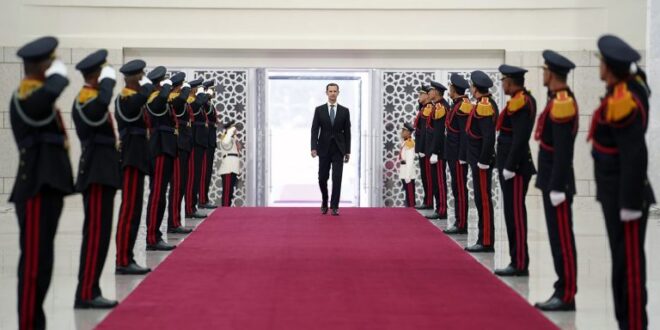The re-election of Syrian President Bashar Al Assad illustrates the failure of Western policy thus far to achieve meaningful political change in Syria.
Russia and Iran have benefitted strategically from their respective military support of the Assad government.
The July 2021 renewal of a UN cross-border aid mechanism to opposition-held territory in northern Syria ensures ongoing humanitarian assistance to millions in need, but countrywide economic distress persists.
Syria remains ostracized by the international community, but some Arab states are restoring ties to Damascus in an attempt to exert influence in the country.
The 2011 uprising against the regime of Syrian President Bashar Al Assad appeared, at times, on the verge of ushering in a new era in Syria. However, after seven years of extensive military support from Iran and Russia, Assad’s re-election as president on May 26, 2021 demonstrates that the regime remains firmly in power. Iran, in particular, has been able to derail any political restructuring plan that would dilute Assad’s authority, even though Iran is a participant in multilateral talks in Kazakhstan (known as the “Astana process”) to achieve precisely that objective. The May presidential election followed patterns akin to those that predated the uprising—Syrian voters had virtually no choice in who would lead them. Syrian government election officials ultimately announced that Assad received 95.1% of the vote. His challengers, former state minister Abdullah Salloum Abdullah and Mahmoud Ahmed Mari, a member of the so-called tolerated opposition, gained 1.5% and 3.3% of the vote, respectively. Both men represented minority parties that were splinter factions of the ruling Ba’ath Party and differed little from Assad ideologically or politically.
Assad’s dependence on Russia and Iran has benefitted both powers strategically. Russia is utilizing its presence in Syria to weaken United States’ influence in the broader Middle East and to reinforce its image as a major global power. Iran is using its proxies in Syria to compel the Biden administration to withdraw all U.S. forces from the region. Iran deploys Islamic Revolutionary Guard Corps (IRGC) advisers to Syria to assist Assad’s forces and to support pro-Iranian militias, some of which are Iraqi and operate on both sides of the Iraq-Syria border. In recent weeks, Iran-backed militias in eastern Syria have attacked U.S. forces, who operate there against the so-called Islamic State, in retaliation for Biden administration strikes on militia facilities that straddle the Iraq-Syria border. Both Russia and Iran have downplayed the Assad regime’s continued attacks on opposition-controlled territory in northern Syria.
The multiple outside actors involved in Syria have also complicated the humanitarian situation there significantly. Earlier in July, Russia threatened to veto the renewal of a UN cross-border aid mechanism that facilitates humanitarian assistance to civilians in northern Syria, without which all international aid would need to be distributed through government-held areas. Achieving that outcome would, in Moscow’s view, enhance the regime’s international legitimacy, although it would not be a viable solution at the scale needed. The program, through which humanitarian aid flows into Syria from Turkey at the Bab al-Hawa crossing, has ensured UN aid access to the approximately four million Syrians in opposition-held areas of northern Syria. Amid precarious conditions exacerbated by an ongoing financial crisis and fallout from the COVID-19 pandemic, the UN program’s continuation was considered vital to preventing a catastrophic level of humanitarian crisis. On July 9, one day before the mechanism for cross-border aid was to expire, the Security Council unanimously voted for a resolution to extend the use of the Bab al-Hawa border crossing for humanitarian assistance to northwest Syria for a year. Despite this rare instance of U.S.-Russia compromise, international efforts to reinstate use of additional border crossings in Syria for more effective aid provision throughout the north were unsuccessful, due to Russia and China’s insistence on only approving one border crossing. Since the mechanism began in 2014, the number of approved crossing points has been progressively limited due to Russian pressure, from four to one, even as the UN and other aid organizations report that existing cross border programs are unable to meet rising demands for their services. Contributing to challenges to humanitarian operations in the region is U.S. reluctance to lift counterterrorism measures in some areas, an approach reported to have hampered aid efforts due to stringent compliance needs.
Yet, efforts by Russia and Iran to restore the international legitimacy of the Assad regime have been largely unsuccessful. Syria remains subject to significant U.S. and European sanctions that have depressed the Syrian economy, kept it largely isolated from the international financial system, and prevented any meaningful reconstruction. Syria continues to lack basic resources such as gasoline and other commodities. Still, the regime has managed to cling to power, and some of the Arab states that suspended Syria from the Arab League in 2011 over its use of military force against the rebellion are rebuilding ties to the Syrian government. Jordan, the United Arab Emirates, and Bahrain reopened their embassies in Damascus, and Oman reinstated its Syrian ambassador. In April 2021, the UAE sent a planeload of food and medical aid, including COVID-19 vaccines, to help the government cope with the pandemic. In May 2021, Director General Khalid Humaidan, the head of Saudi Arabia’s chief intelligence institution, visited Syria and met with General Ali Mamlouk, one of the architects of the regime’s military crackdown on the rebellion and key interlocutor with Russian forces advising the Syrian military. These Arab states hope that their engagement with Damascus will balance Iranian, and to a lesser extent Turkish, influence on Syria. However, with the internal Syrian conflict continuing, Russia and Iran steadfast in Assad’s camp and entrenched there militarily, and Assad defiant against yielding any power to a broad-based government, there are few prospects for Syria to rebuild its international legitimacy or its economy any time in the foreseeable future.
 Eurasia Press & News
Eurasia Press & News




